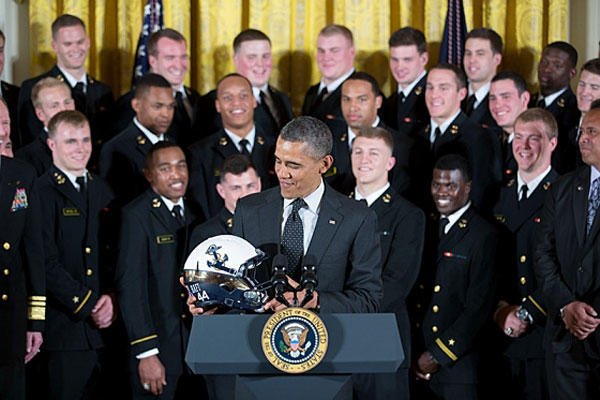The upcoming general courts-martial on aggravated sexual assault and abusive sexual contact charges against two former Navy football players have all but guaranteed a high-profile test case on the issue of unlawful command influence in the military justice system that will include that of the commander-in-chief.
Naval Academy Superintendent Vice Adm. Michael Miller announced his decision to refer the two midshipmen to courts-martial Thursday morning. By the afternoon, a civilian defense attorney for one of the midshipmen had already said Miller succumbed to political pressure to crack down on sexual assault within the military.
"When you weigh what happened against the evidence, there can be no other conclusion but that Vice Adm. Miller came under political pressure [to refer the midshipman to general court-martial]," Ronald "Chip" Harrington said. "Clearly, this case has generated an enormous amount of press coverage, including comment from the president of the United States."
Congress didn't waste any time weighing in on the case either. Sen. Kirsten Gillibrand, D-N.Y., served notice that she will cite the Naval Academy sexual assault case in her efforts to legislate a major overhaul of the Uniform Code of Military Justice to take away commanders' authority to refer charges and overrule decisions in courts-martial.
“It is time to move the sole decision-making power over whether serious crimes go to trial from the chain of command into the hands of non-biased, professionally trained military prosecutors -- where it belongs," Gillibrand said.
Midshipman Eric Graham has been charged with abusive sexual contact under Article 120 of the UCMJ and Midshipman Josh Tate has been charged with aggressive sexual assault under Article 120, the Naval Academy said Thursday. Both were charged with making false statements under Article 107.
The charges stem from a report by a 21-year-old female midshipman who said she was raped by Graham, Tate and Midshipman Tra'ves Bush after a house party in Annapolis, Md., on April 14, 2012. The charges against Bush were dismissed Thursday.
In early May at the White House, Obama cited reports on increasing incidents of sexual assault in the ranks. He had a message for leaders across the Defense Department:
“I expect consequences. So I don't just want more speeches or awareness programs or training, but ultimately folks look the other way. If we find out somebody's engaging in this, they've got to be held accountable -- prosecuted, stripped of their positions, court-martialed, fired, dishonorably discharged. Period," Obama said.
At the Naval Academy commencement later in May, Obama called on midshipmen to stand up against sexual assault, warning that sex abuse and harassment “threaten the trust and discipline which makes our military strong."
Defense lawyers have already pointed out that two weeks after Obama's address, Miller referred the charges against the three football players to an Article 32 hearing on whether there was sufficient evidence for a court-martial.
John Schofield, the Naval Academy spokesman, explained Thursday that Miller had to balance all the information from the case to include the recommendation of the investigative officer. Schofield was clear in saying that Miller did not allow any political pressure to affect his decision to refer the charges to an Article 32 hearing or a general court-martial.
"The convening authority determined that reasonable grounds did not exist to believe that the offense of Article 120 was committed by Midshipman Bush. He determined reasonable grounds did exist to believe that the offenses were committed by Midshipman Graham and Midshipman Tate," Schofield said.
However, Obama's remarks, and the remarks of the service chiefs against sexual assault, have been cited in previous cases of sexual assault in the military.
In June in Hawaii, Navy Cmdr. Marcus Fulton, presiding as the investigating officer in an Article 32 hearing on two sexual assault cases, ruled that Obama's remarks as commander-in-chief would unduly influence any potential sentencing of the two defendants.
Fulton approved defense motions that, if convicted, the defendants could not be given bad conduct or dishonorable discharges in sentencing.
“The strain on the system created by asking a convening authority to disregard [Obama's remarks] in this environment would be too much to sustain public confidence," Fulton said.
The current environment in the military with the military chain of command demanding more accountability from subordinates in sexual assault cases also increased the likelihood that defendants would claim unlawful command influence was used against them, said military law analyst Gary Solis.
“What a defense lawyer should do is made a lot easier in today's climate. In a case like this, under such high visibility, I'd bet money it will happen," said Solis, a former judge advocate general and military law professor at Georgetown University and West Point, about the likelihood undue command influence will be invoked during the Naval Academy sexual assault case.
It is possible and it has happened that cases under the Uniform Code of Military Justice have been set aside because of remarks made by a president and others in the chain of command, Solis said.
Under the UCMJ, defense lawyers can also grill prospective jurors on whether they were aware of the remarks by Obama and others in the chain of command, and whether those remarks would influence their judgment, Solis said.




























